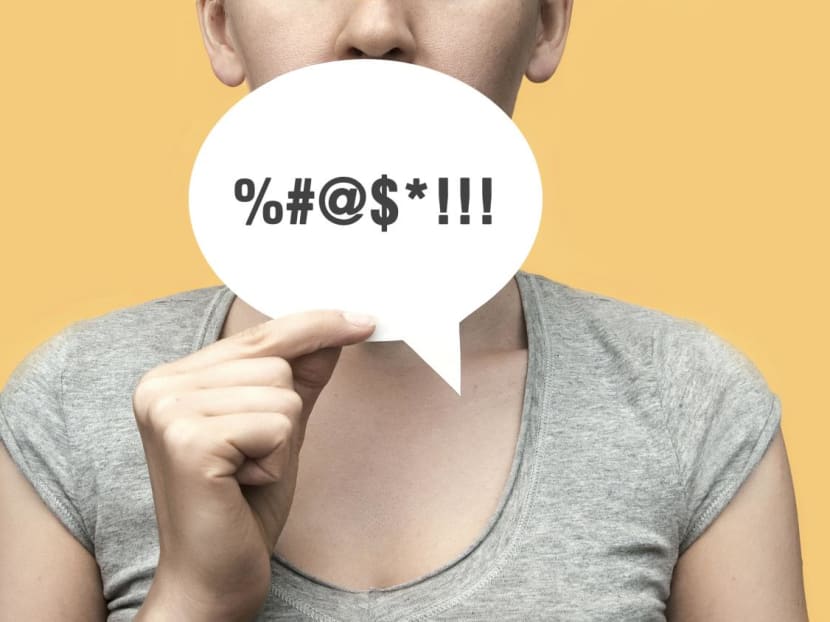Commentary: Mind your F's and S's? Swearing in the workplace is a grey area, but some lines shouldn't be crossed

When someone drops an F-bomb in the office, does it make you cringe, or do you see it as part of everyday speak?
When someone drops an F-bomb in the office, does it make you cringe, or do you see it as part of everyday speak?
Let me be first to say that I do not have a clean tongue. I've let a few expletives slip myself more than a few times — but a few encounters with colleagues and other parties in the workplace and in professional settings have given me pause for thought.
Really, the question is: Is what’s appropriate with one’s friends and family also appropriate in the workplace?
One interesting perspective is that swearing indicates a lack of better vocabulary with which to express oneself — an idea that has since been debunked by many experts. Nevertheless, this begs deeper thinking about the overall impact of our word choices, particularly in a professional context.
STICKS AND STONES?
Swearing comes in different languages and expressions. In Singapore, our multicultural melting pot means we don’t just have the typical “f***” and “s***” heard in Western societies.
Our locally spawned profanities come in an array of languages and dialects and can be even more rude than their common English-language cousins, whether it might describe someone’s mother’s nether regions, or insulting someone’s father.
And then there are the religion-based swear words: For example, a former colleague frequently used "Jesus Christ" as an expletive, which made a few people uncomfortable, myself included.
Tone and intent definitely matter as well. Is one swearing in a “friendly” or “casual” manner? Or is it directed at someone in particular, underscored with hostility or other negative sentiments?
The former lands in a grey area — that’s “just how someone speaks” from day to day. The latter, however, should leave no room for argument. Any verbal abuse in the workplace should immediately be brought up to the relevant human resource (HR) representatives.
One’s working requirements and environment does play a part as well. In certain environments like a multinational bank where I used to work, swearing in internal chats would automatically trigger a flag and be highlighted to your manager.
A friend shared that in her own line of work — logistics and warehousing — swearing is much more common. People use language like that in order to “get straight to the point”, she shared, and generally mean no harm by it.
All considered, it’s hard to paint swearing as a one-size-fits-all situation in the workplace.
FEELING SAFE IN THE WORKPLACE
That’s not to say nothing should be done about the use of expletives, especially when it crosses over into abuse.
Here are three questions to ask yourself:
- How does it make you feel when someone in the workplace swears in front of you?
- Is the swearing directed at you or someone else, or is it just used as an illustrative adjective or adverb
- If you do feel discomfort about a colleague’s language or word choice, does it affect your ability to work effectively with or around them?
At the end of the day, we spend most of our days at work. We even spend more time with our colleagues than our friends and family on a daily basis.
A little discomfort may not seem like much at first, but it adds up. In the long run, minor but repeated discomforts can negatively affect your view not just of your colleagues, but also your workplace.
Of course, yardsticks for measuring “appropriateness” in the workplace will continue to change with the times, as they have always done. Regardless of such changes, feeling safe in the workplace should always be a top priority.
MORE THAN WORDS
If a colleague’s swearing makes you uncomfortable, make it known. If you have a good rapport with that colleague, you can share privately and respectfully that the words they use have a detrimental effect on your focus and sense of safety.
If you’re not well acquainted with this person or are unsure how they will react, approach your manager or your HR representative for guidance or help with communicating your discomfort to your colleague — confidentially, if that makes you feel more secure. A positive, growth-focused company culture will strive to respond to any feedback indicating distress on the part of their staff.
Ben Jonson, a playwright and poet in 16th-century England, once said: “Language most shows a man: Speak, that I may see thee.”
Speech may be just one aspect of how we perceive each other, but it’s a uniquely revealing one. Would you rather be seen as the person cursing all the time, even if it’s “just the way you speak”? Or would you rather be seen as someone who puts careful, intentional thought behind their words?
For my part, I’m trying to be more positive about the words I use to communicate with others, in both personal and professional settings.
However, personal choices aside, we should all have the freedom and agency to choose a working environment in which we can feel comfortable and safe — and to speak up when we don’t.
ABOUT THE AUTHOR:
Chua Ee Chien is the Asia-Pacific director of business development - fintechs at GTN. He writes on LinkedIn about personal finance, current events, work-life balance and entrepreneurship.







